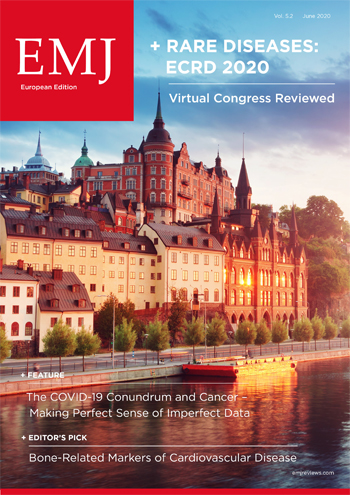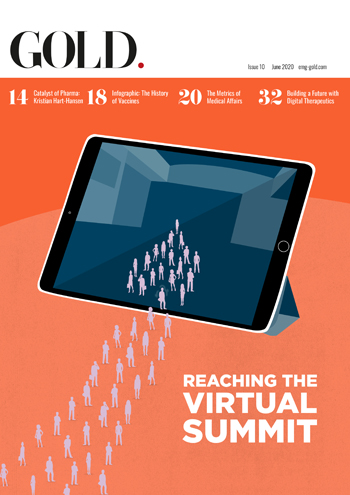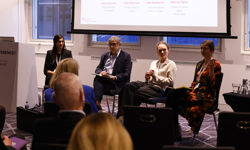
For a business built on publishing journals covering live conferences and symposia, the cancellation by an unforeseen pandemic of all such live events for the foreseeable future sounds, well, cataclysmic. Yet an agile business model, a strong team with closely aligned values and determination to succeed in the face of the Covid-19 crisis is powering not just survival at EMG-Health, but growth.
Launched by serial entrepreneur Spencer Gore back in 2012 with just two interns, EMG-Health – the EMG stands for European Medical Group – provides medical education services to healthcare practitioners with a suite of products ranging from journals and magazines to podcasts, videos and webinars, and business intelligence.
Gore’s “first proper job” after university and a few years in TV, which was in sales working at a publishing company, is where the thinking behind EMG-Health first stirred.
His idea was to publish content from a major industry congress in an ebook for those both able and unable to attend. However, the company he worked for at the time said thanks but no thanks. So, he left to set up his own business to do it himself.

“I set out to publish a hybrid open-access healthcare journal for ophthalmology congress – without subscription or any charge to the doctors whose content would appear in it, but funded by the pharmaceuticals businesses who use such events to reach and inform healthcare professionals,” he explains. “And to publish it within six weeks of that event taking place.”
Eight years on and by the start of this year, EMG-Health’s 55-strong workforce was publishing 20 journals linked to specialist content shared at congresses and symposia across 18 therapeutic healthcare specialisms – ranging from Allergy to Oncology.
Though its journals’ content is paid for by pharmaceutical companies, Gore says content is pharma-supported rather than advertorial as EMG-Health has editorial control and everything is peer-reviewed. All are digital-only, although specific clients can buy reprints.
Also part of the stable is a best-of-the-best round-up from all the events from which it publishes content – its quarterly EMJ (European Medical Journal, launched in January 2016). And in June 2018, it launched GOLD – a magazine delivering educational content to senior pharmaceutical executives, which comes out six times a year.
In total, the company will publish 32 publications this year.
Also part of the EMG-Health group of businesses are European Medical Careers – an online job board for healthcare professionals with plans to evolve into a recruitment agency; European Medical Media – a medical communications agency providing bespoke content creation services to healthcare company clients; and European Medical Education, offering online educational resources such as tests, questionnaires and webinars.
Healthcare is, of course, a crowded market. And since 2012, Gore has worked hard to hone EMG-Health’s USPs – many of which relate to its culture which, as founder, he has shaped.
“I am incredibly competitive,” he readily admits, pointing out that the year of the company’s birth was also the year of London 2012. “If I’m committed to something, I want to be the best. I’ve used a business coach pretty much weekly for the last eight years.”
Having the right team – and working within a culture in which that team is self-driven and empowered – is a critical success factor.
Values based
At the start of his business, Gore says, he spent considerable time identifying his values. And at that time, with just two interns in tow, his values soon became theirs. But as the company grew, it needed a more considered and structured approach. Now in place, he says this enables EMG-Health to recruit partly based on values rather than just results.
“Obviously, you need competence or an ability to learn, to do that job well,” Gore explains. “But if someone’s values and mine don’t align, that hiring probably won’t work.”
So, when recruiting, as well as assessing competencies and skills, the final interview is always values-focused.

“We have a very specific values set we look for,” he says. “And we are committed to nudging those with the strongest fit towards being the most skilled and competent they can be through training or re-training if needs be, which sometimes means moving to a different department.”
The ten values he looks for include being proactive, loyal, positive, inspiring, hard-working, passionate, and potential for being a driver of high results. As many are terms most ambitious candidates would inevitably use to describe themselves, exemplars of best practice in each are discussed at interview – against which candidates are asked to rate themselves with supporting evidence.
“Whether or not you like Eddie Izzard as a comedian, you can’t fault his passion and commitment when he raised £1m+ for Sport Relief running 27 marathons in 27 days,” Gore says. “I’d say that’s a ten out of ten for passion. If you think you’re an eight, tell me why.” (To date, Gore can’t remember anyone saying they’re more than a seven …)
Once hired, all employees – barring the three most senior executives – are regularly assessed and scored against all ten desired values, with results shared amongst staff via a league table. Awards for values are given at an annual event. And quarterly values performance incentives are offered each quarter.
“This is why, I believe, we did more new projects in the 12 weeks after we went into lockdown than we did in the previous 12 months,” Gore adds.
“The fact we were a young and agile business helped us massively over the past eight years, but it’s helping us even more so, now. In current circumstances, you need to move quickly. And we were already well set up so that when we make a decision, we implement it now.”
In short, having the right team – and working within a culture in which that team is self-driven and empowered – is a critical success factor.
“Despite what else is going on, our publishing strategy today is as it’s always been: to look where there is a gap in our market then fill it,” Gore explains.
“We love innovating and launched an innovation journal because of it. We have also worked closely with Professor Tony Young (NHS England’s national clinical director for innovation) for the past seven years. And we’re not afraid to fail because, when you do, you learn from it.
The pandemic has been a major catalyst in the speeding up of digital transformation in healthcare.
Response to Covid
“This means with Covid-19, we’ve been happy to jump in and try stuff.”
Between March and early June 2020, EMG-Health had to postpone plans for seven of eight US launches planned for this year. However, it also launched a cluster of new digital products not even under consideration back in February – to help pharma companies unable to advise doctors in person about latest research and new products to do so digitally.

“We looked at how best to leverage what we had, so developed more podcasts, commercial webinars and came up with a plan for a learning experience platform which we will soon roll out – sponsored by a top five pharma company,” he explains.
On top of that, the team created new content and products – such as an online ‘needs and offers’ area for Covid-19 healthcare service providers, fundraising and volunteering pages – not for profit, but to help connect its titles’ readers to help each other.
The pandemic has been a major catalyst in the speeding up of digital transformation in healthcare, he adds.
“As an industry, healthcare was around five years behind many in terms of digital – a gap which Covid-19 is closing fast, which is creating new opportunities,” Gore explains. “One pharma company I recently spoke to said that at the start of the year, 1% of its interaction with doctors was digital but now it’s 100%. That’s a big opportunity.”
Major challenges remain, of course.
Though congresses will return eventually – because you can’t network online as well as you can face to face, Gore points out – until then, more content, interaction, and education will be done online which will test everyone’s ability to keep connections, interactions and motivation going.
“Evolving is the only way to describe how things are at the moment,” he adds. “Things are still so hard to predict.”
If he has learned anything in the past twelve weeks, Gore says, it is the importance of having in place the right team – by which he means a strong team which is highly motivated – and an organisation sufficiently agile to leverage what it’s got and what it can do well.
“In April, we generated more revenue from new products that had not previously existed than we generated in March from pre-existing products,” he reveals.
Though back in January, he was confident EMG-Health would double its 2019 revenue in 2020, it soon became clear this was unattainable. And yet, Gore now says, hopes are high that EMG-Health will come out ahead by 2020’s end, year-on-year.
“We’re not anywhere near where we wanted to be at this point in the year,” he admits. “But we’re in a good position compared to many out there.” And in current circumstances, that in itself is a win.
Our publishing strategy today is as it’s always been: to look where there is a gap in our market then fill it.
This article was first published in InPublishing magazine. If you would like to be added to the free mailing list, please register here.










